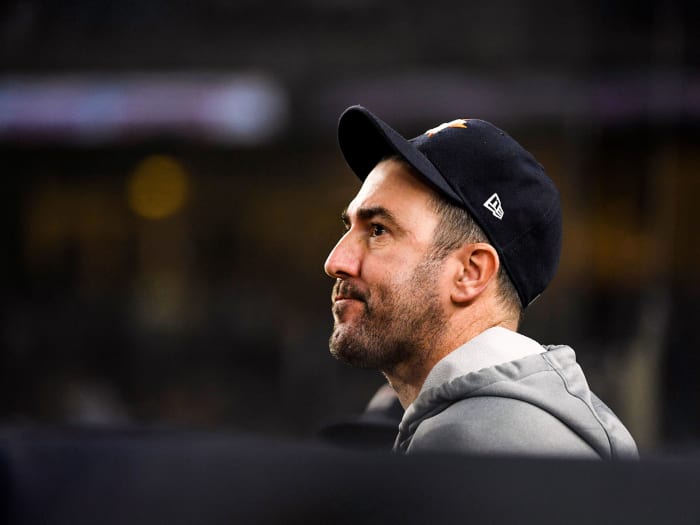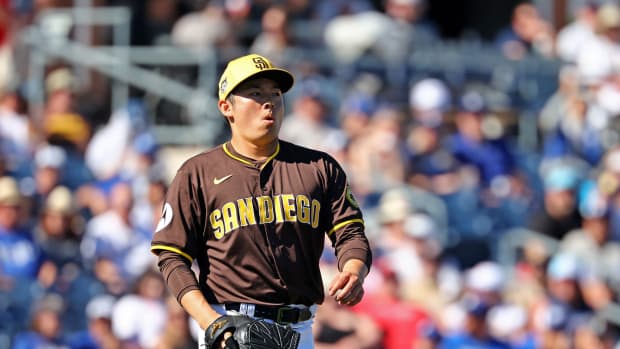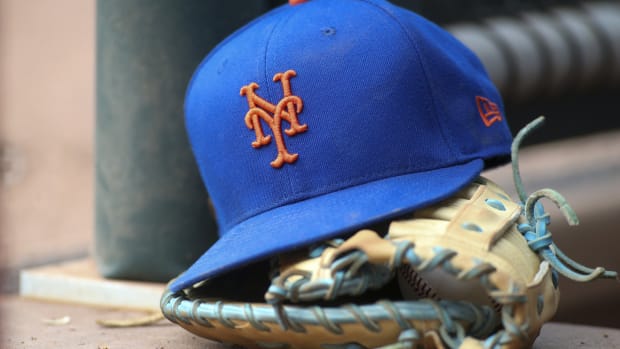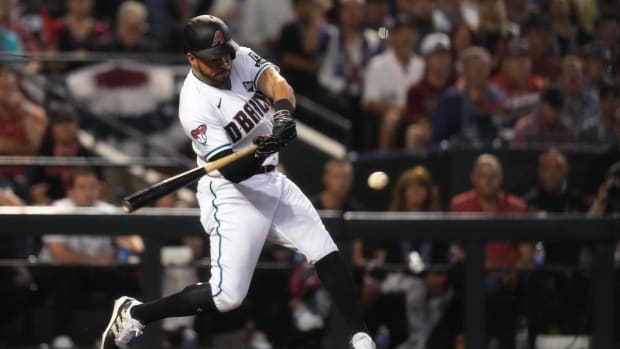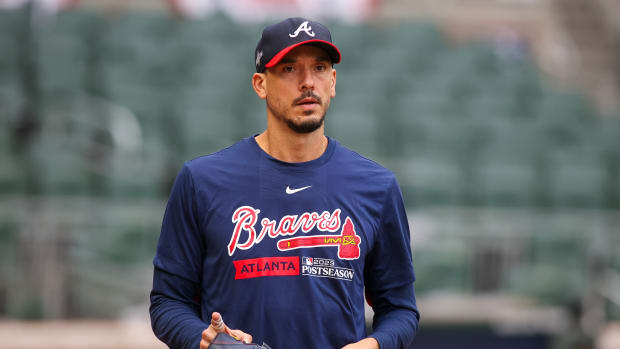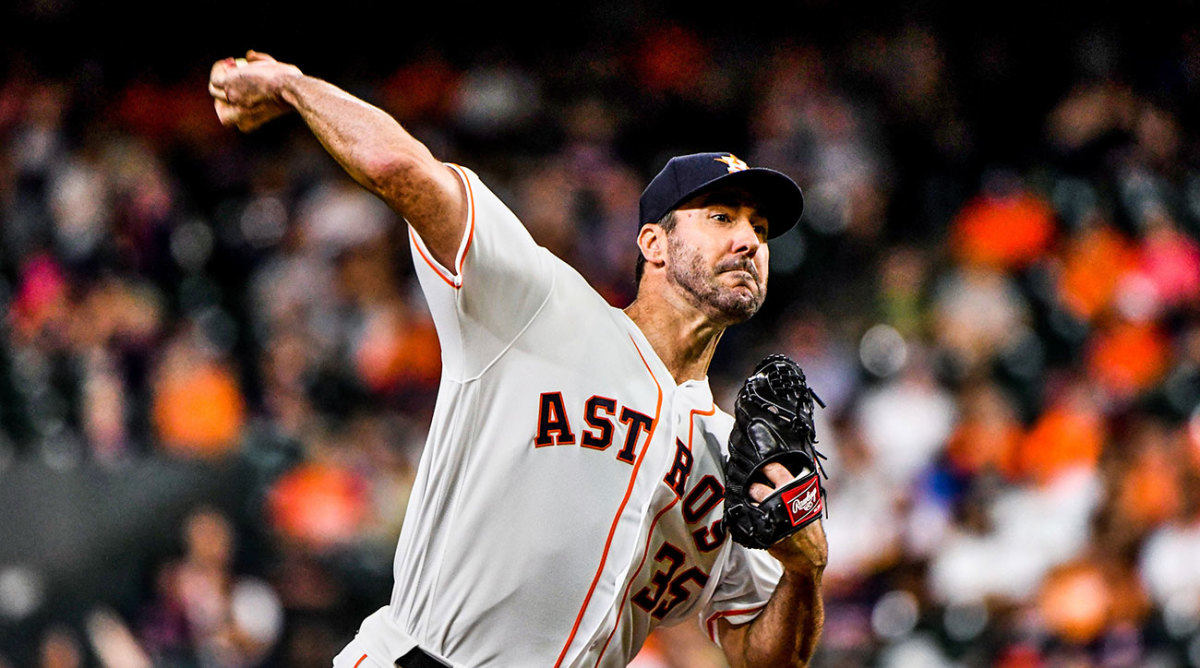
Verlander's Singular Ceiling Makes Him a Unicorn Houston Had to Retain
The world was Justin Verlander’s oyster this offseason. The active MLB wins leader reportedly attracted more than half of the league’s teams to his free agent showcase earlier this month, where he ably showed off his entire arsenal of blistering pitches—including a fastball that touched 97 mph, according to the New York Post’s Joel Sherman, prompting eager speculation that his cannon of a right arm was revamped and ready for action.
The rumor mill kicked into full gear about Verlander’s next destination. Would he star for the Yankees in New York, his wife’s favorite team? Would he join his former manager on his former team in Detroit? It turned out that all along, he wanted to stay right where he was.
On Wednesday, Verlander reportedly agreed with the Astros on a one-year, $25 million deal with a player option for an identical salary in 2023, per MLB Network’s Jon Heyman. It amounts to a $50 million guarantee for a two-year commitment—a slight downgrade from his previous two-year, $66 million deal with Houston that just expired.
Of course, Verlander ended up making just one appearance for the Astros over the course of that contract after undergoing Tommy John surgery last year. Given that context, a $50 million guarantee for the 38-year-old Verlander is quite the coup, continuing what has been an unexpectedly active market for starters early on this offseason. It will also turn out to be a bargain for Houston if Verlander resumes his pre-injury form.
After being acquired from Detroit in August 2017, Verlander won his first and only World Series with the Astros that year, finished second in Cy Young award voting in 2018, then won his second Cy Young in 2019. Along with fellow free agent Max Scherzer, he’s one of the few remaining of a dying breed of workhorses. Zach Wheeler, the 2021 MLB innings leader and National League Cy Young runner-up, pitched 213⅓ innings this season. Verlander has topped that figure eight times, including during each of his two full seasons with the Astros.
With Corbin Burnes narrowly capturing the NL Cy Young this year, the award’s voters showed a slight preference for dominance in short doses rather than above-average effectiveness over the long haul. In Verlander’s most recent full season, he showed the capability to combine both in a way not even Scherzer could this year.
| Pitcher (Year) | IP | ERA | ERA+ | BB/9 | SO/9 | WHIP |
|---|---|---|---|---|---|---|
Justin Verlander (2019) | 223 | 2.58 | 179 | 1.7 | 12.1 | 0.80 |
Corbin Burnes (2021) | 167 | 2.43 | 176 | 1.8 | 12.6 | 0.94 |
Zack Wheeler (2021) | 213.1 | 2.78 | 150 | 1.9 | 10.4 | 1.01 |
Max Scherzer (2021) | 179.1 | 2.46 | 166 | 1.8 | 11.8 | 0.86 |
That potential explains why the Astros were willing to wed themselves to Verlander into his 40s, even as he’s coming off of two lost seasons. It similarly shouldn’t come as a shock that Verlander, who reportedly “felt loyalty” toward the Astros and team owner Jim Crane, preferred Houston as a form of stability in his life as he works his way back from Tommy John. After all, he’s turning 39 in February and has a family with a home in Houston (in addition to reported residences in Los Angeles and south Florida, where the Astros conduct spring training, but I digress). After Verlander's first daughter was born in April, undoubtedly changing his life in an indescribable manner, he won’t have to change his work routine. It still feels like a mild surprise this reunion came to fruition, however.
USA Today’s Bob Nightengale and ESPN 97.5 Houston’s John Granato had reported that Astros players put the kibosh on Verlander throwing out a ceremonial first pitch during the playoffs after he was away from the team throughout the season. With Verlander heading toward free agency, many took that to mean he and the Astros were headed toward an ugly divorce. That clearly wasn’t the case. But if those reports were true, there may be some fence-mending that needs to take place in the clubhouse, even though Verlander’s absence was publicly defended by GM James Click as the ace merely adhering to COVID-19 protocols. Regardless, there obviously wasn’t enough animosity between Verlander and his teammates to prevent a reunion here, and naturally, him doing his part to help Houston to its sixth straight ALCS would be the best form of mediation.
In Houston’s World Series defeat to Atlanta, both teams had to overcome the loss of their presumed Game 1 starters. Lance McCullers Jr. was left off Houston’s roster after suffering a forearm strain, while Charlie Morton exited the opener with a fractured fibula after heroically gutting through as much as he could on a broken leg. How each team responded to the adversity dictated the result of the series.
The Braves had a second ace to fall back on in Max Fried, who led MLB with a 1.74 ERA in the second half and hurled six shutout innings in Atlanta’s series-clinching Game 6 win. The two Astros who were called on to make two starts were Framber Valdez, who in each of his outings allowed five runs and couldn’t escape the third inning, and Luis Garcia, who took a pair of losses after allowing four runs (and five walks) in 6⅓ combined innings. Relievers may reign supreme in October in the modern era, but you still need some starters who can soak up innings and prevent the bullpen from getting overtaxed at the end of a long season.
After McCullers went down, Houston didn’t have anyone who assumed that role. Now, they have a future Hall of Famer who’s the surefire choice to lead any playoff rotation if healthy and in form. And his presence makes the entire rotation look better. McCullers, who finished seventh in 2021 AL Cy Young voting, is perhaps the best No. 2 in the junior circuit. You don’t find many No. 3 pitchers who’ve thrown eight innings of one-run ball in the ALCS as Valdez did. Garcia, Jose Urquidy or perhaps even Cristian Javier or Jake Odorizzi all have the potential to capably maneuver through opposing lineups in the postseason once or twice, which is the maximum expected of back-end starters in October these days.
It may be hard to believe, but Verlander has been tagged with the loss in his last three postseason starts for Houston. The two most recent outings were in the seven-game World Series defeat to Washington in 2019. In both, Verlander allowed the go-ahead runs to score in his final inning of work.
In the seventh inning of Game 2, with the score knotted up at two, he served up a solo home run to Kurt Suzuki—the first of six runs to score in the decisive frame.
Then, in the fifth inning of Game 6, with Houston leading 2-1, he gave up a game-tying solo shot to Adam Eaton before allowing the go-ahead blast to Juan Soto two batters later. The Astros didn’t score again that night, then lost Game 7 the following evening to choke away the championship on their home field.
The game has shifted even in the short span of time since those losses. If they happened this year, Verlander may not have been permitted the opportunity to face the go-ahead run in either instance.
But then again … maybe he would have been left on the mound. This is Justin Verlander we’re talking about, the man who’s said he wants to pitch until he’s 45. That would make him the closest thing baseball has to Tom Brady. And do you take out Tom Brady in the fourth quarter? If Houston lives up to its expectations and makes noise again in October, Dusty Baker will be confronted with that choice at some point. And if the old-school manager decides to adhere to the new-school way of thinking and removes his old-school pitcher with the game on the line, we’ll definitively know it is the end of an era.
More MLB Coverage:
• Rankings and Predictions for MLB's Top 50 Free Agents
• Tigers State Their Intent With a Savvy Signing
• Thor Gets a Halo ... Now What?
• Relief Pitching Is Out of Control
• Astros Couldn't Silence the Naysayers—and Never Will































